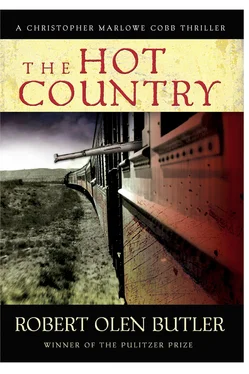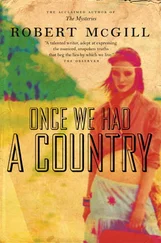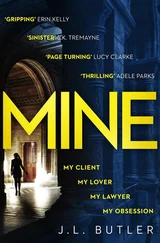I felt I was in the same position I was a few moments ago. Having to portray myself. In words this time, which shouldn’t have been as intimidating, as inevitably distorted. But this was not how a reporter used words. I was stuck. But I needed to speak.
“I report,” I said. “I ask questions. I know more now than I did when you put a pistol to my head. A lot more.”
“Not that,” she said, even more gently. I didn’t have a clue what she wanted. Perhaps a clue, but I dared not be wrong. So I said nothing. I looked beyond her to the waning gibbous moon. I looked away from her altogether. I stared into the night in front of me, seeing nothing. Thinking now: I have my story . I dared not rush with her but I had no time. I had to go. I had to write. I had to telegraph. And whatever else might follow that, one thing was certain: I could not return to a Pancho Villa camp.
And I had to go very soon.
So this was when I would, under other circumstances, take a woman.
I heard myself.
I thought it in just such terms.
And though the woman would have to be willing or readily persuadable, I suddenly could not ignore the frame of mind.
I knew more now than I did yesterday riding into Villa’s camp.
I knew much more than I did three days ago sitting next to Mensinger on a bench in the train station in Mexico City. About so many things. And some of them had to be told to the people of Chicago and the people of the world. Urgently.
Without looking at Luisa I said, “I have to ride away from here. Soon.”
She did not answer.
“I won’t be able to return,” I said.
Still there was only silence beside me.
I moved my face, but just barely enough so that I could see her. She was looking forward into the night as well.
I said, “Forgive me if this is the wrong thing to ask. And please understand that it is not a way to suggest what I suggested in Vera Cruz. But do you want to ride away with me?”
I was still watching her. She did not react. She did not even seem to hear me. But of course she did. The stillness in her went on. And it began to feel like its opposite. The stillness was, in fact, intense and complex activity. And this was how she was showing it. I stopped watching her.
Before my eyes and hers were the same stretch of moonlit mesquite and high-plains desert floor and train bed and darkness and stars, but we were seeing quite different things, I was sure.
I laid my hands on the tops of my legs, halfway to my knees. I scattered all the matters of my life out before me, turned them into the stars, simply watched them burn, coolly and distantly, indistinguishable one of them from another.
And I waited. I waited. And then I felt her hand fall lightly on top of mine.
I turned my face to hers.
I did not understand her. I did not understand why she might want to do this now. But I did know that I could not let myself behave as I usually did.
She was waiting and I was waiting, her hand on top of mine. And we understood each other.
She lifted her body and swung her leg over my lap and she pushed me down and I lay back upon our bed of stone and we each exposed the parts we needed for this and then we did this act in a way I could never have imagined: She rose above me against the stars and I could see her face, half lit bright in the moonlight and half dark in shadow, and I let her move for us and I let her do for us and I did not know, exactly, who I was with her, but I did know I was with her now, this Luisa Morales.
And when we finished, and she slowly let her body sink down upon mine from above, and she kissed me on the lips and I kissed her, and she moved a little downward and turned her head and laid it on my chest, when we were quite still and we were quite happy in our bodies, I said to her, “So does that mean you will ride with me?”
And she said, quite gently, with a soft quaking of regret in her voice, “It means I will not.”
And once again I knew nothing.
Except, with Luisa’s head on my chest and me watching the night sky, the time that followed felt as if it was not time at all but a kind of death.
And then we knew we must return.
We rose and we covered the uncovered parts of us and we walked west along the train tracks. When we neared the first fringe of the thousands of soldiers billeted in the desert, we began to hear singing from the campfires, from many campfires, each group hearing only itself, but Luisa and I heard them all in soft cacophony.
And we stopped beside the boxcar where she slept with the other women who had lately arrived.
We stood before each other, searched each other’s face. “Why?” I asked.
“I must do it my own way,” she said.
And she stepped into me and we kissed for what surely was the last time.
“Go,” she said. “Quickly.”
I did.
I was passing Villa’s car and I was suddenly aware of something I’d not thought of since I left Mensinger’s quarters: A pistol was strapped to my hip. I stopped. I looked at the lights in Villa’s windows. I turned and looked back along the track. Luisa was gone.
And inside my head, maps were unfolding: Texas, San Antonio, a hand-drawn layout of the Alamo. It was time to report. I hustled along the tracks.
In the postal car I took off my sombrero and my serape. I lit a kerosene lamp and carried it to the sorting table which was soon to be my bunk but now would be my desk. I set the lamp off center to the left. I unbuckled my pistol belt and removed it. Luisa’s knife hung there next to the holster. I felt a surge of fear for her. Would this be her own way? But no. I didn’t think that was in her anymore.
I rolled the belt around the holster and the scabbard. I didn’t know where to put the objects in my hand. They did not feel as if they were mine. Finally I just laid them at my feet, next to my saddlebags. I moved to the nearest cluster of spindle-back chairs and I carried one to my desk and carefully positioned it.
I had not opened my saddlebags since we arrived. But for now I needed only two things. I bent to them. I removed my Corona and a packet of foolscap. I placed the typewriter before me and unfolded the carriage. I rolled a piece of paper into the machine. I sat down before it. I was happy to be in front of this machine once again. My fingertips knew me. They wired me like a telegraph to the place in my head where my reporter’s voice was ready to speak what it had heard, what it had learned.
I’d type the contents of Mensinger’s document portfolio straight into mid-story form. When I crossed the border I would have a large enough writing task ahead of me as it was.
I focused. I pictured the first document. Kaiser Willie’s letter to Villa. I saw the Imperial Eagle spreading its wings. It would turn into words. I lifted my hands. They hung, fingers curled, over the keyboard.
And my hands snapped back as a voice suddenly filled the room. “Do you find rebellions fueled by strong coffee, Mister Chance?”
I let my hands fall to the tabletop, one on each side of my typewriter. I did not look at him.
He said, “Or is it Herr Cobb? Yes, I think it is Herr Cobb.”
I turned my face. My concentration was keen and he was quiet. Mensinger was standing barely ten feet away. His hands hung at his side, palms inward, like a gunfighter. He was not wearing his pistol, however. He was wearing his British cavalry sword. If he was planning to kill me — and he probably was — then he’d rather do it his own way, and silently.
“I think it is Herr Cobb,” he said, “the journalist turned bandit. You seem to have impressed Jefe Villa.”
And I considered my pistol somewhere nearby on the floor. But to bend, to unwrap the belt, to draw the pistol, to straighten up, to turn, to find him, to shoot him: He would have easily drawn his sword and run me through long before I could do all that. He no doubt knew this. He’d been quietly watching me for some minutes, I realized.
Читать дальше












